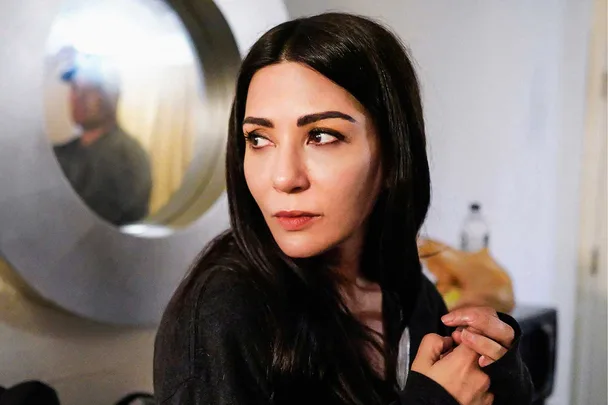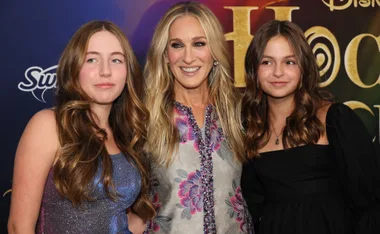An actor sits on the edge of a mattress in a $90-a-night, hard-luck motel room, the grimy curtains drawn. Cobwebs cloud the splotchy ceiling and the room smells musty and of old smoke. In the bathroom, the floor tiles peel at the edges and beige streaks stain the tub and toilet. Bulletproof vests hang on the backs of chairs, ready. On the table are bags of beef jerky, barbecue potato chips and oranges. There are cans of body fuel and enough bottles of water for everyone: two dozen law-enforcement officers from the local county sheriff’s department; two from outside agencies; an FBI agent; two civilian decoys; a former government investigator. And Marisol Nichols, star of the hit TV series Riverdale. But she is not on a Hollywood set, she is playing a role – the role of a parent pimping out a child or, depending on what the situation calls for, the role of a child being pimped out to a guy: a dirtbag on his way to a dismal motel to have sex with an 11-year-old girl who doesn’t exist.
Nichols thumbs a message into a hook-up app popular among men seeking sex with children. She pretends to be the child’s father: “In town today/tonight only, need someone to educate son/daughter while I and ms watch.” (Educate is code for sex.)
Online, Nichols is a trafficker enticing adults who want to sleep with children. On the phone, she feigns the voice of a child, sounding drugged and sheepish. “What do you like?” the men ask, thinking she is 13. She giggles and stammers on cue. Unlike the other roles she’s been cast in, Nichols isn’t being paid for this performance. She flew herself here, halfway across the country from her home in LA, to this midsize, Midwestern city for the two-day op.
Nichols dresses the part in case a perp (perpetrator) glimpses her through the window. She’s 46, but at 163cm with a hoodie over her head and a bedsheet draped across her shoulders, she can pass for a teenager. Or she might wear her long, dark hair matted and put on a beer-soaked Mötley Crüe T-shirt, and suddenly she’s a young junkie mum prostituting her kid. She can play madam or victim.
On this morning, she wears a black baseball cap backwards, a black V-neck T-shirt and bell-bottom jeans. She carries a pack of American Spirit cigarettes. She could be anyone. Most of these guys, she says, are “wimps”. Cowards. Sick men who want to take advantage of a girl. She remembers one sting in which she played a trafficker who set up child sex parties. The target was 38, looked like a real estate agent, probably in a fraternity in college. “Looking the guy in the face,” she says, got her in her gut. “These guys look like normal people. And you’re pretending that you just happily and eagerly set up children for them to have sex with.”
Nichols kept her cool throughout the interaction, but adds: “To watch his eyes” – the way they lit up at the mention of an underage kid – “you want to kick him in the balls and beat the hell out of him.”
Each sting is like a battle that might never end. But if these two days and all the manpower and expenditure of taxpayer money snags a single predator, it will have been worth it – because that man won’t be able to make victims out of who knows how many children.
Child sex trafficking, says Nichols, is commonly viewed as a third-world scourge, but it’s an epidemic in the west too (in the US, for example, estimates place human trafficking victims in the hundreds of thousands). People turn a blind eye because they don’t want to hear the dirty details. People don’t want to know about adults having sex with kids, the things they say they want to do to them. “Your mind protects you from that much evil,” she says. “[But] if good people don’t know about it, it will keep happening, because good people are the only ones who will do anything about it.”
Nichols’ dedication to catching these criminals stems from personal trauma. She was 11 the year her life went to hell – the same age as many of the imaginary young girls she embodies in the stings.
One night she went out with a friend in the Chicago suburbs and was raped by a group of older boys. The memories return in fragments: flashes of “waking up on a bed with no underwear on and everyone laughing”. After the rape, she says, “I remember being kicked on the sidewalk in my stomach in the middle of winter.” She recalls someone saying, “Get up, bitch.”
“It changed the entire trajectory of my life in a day,” she reflects.
Everyone in town knew about it and Nichols turned to drugs, continuing to use into her 20s. She eventually moved to the city to pursue acting, pumping petrol and checking coats between auditions.

Her big break came when she was cast in a pilot in 1995 and relocated to LA, before making her movie debut in Vegas Vacation as Chevy Chase’s daughter two years later.
Next she appeared on CSI: Crime Scene Investigation, Law & Order: Special Victims Unit and Cold Case. More than once, she played a cop,
and as part of her research for roles, she sometimes went on ride-alongs with homicide and narcotics detectives. Her role as a law enforcement officer in
the action/thriller series 24 sparked a particular interest in combating human trafficking.
So when her career slowed around 2012, she got educated on the issue. In 2014 she founded her non-profit, Foundation for a Slavery Free World, and on a trip to witness an undercover operation on child sex tourism in Haiti, she was spontaneously asked to deploy her acting skills to help catch a predator. Since then she’s participated in half a dozen child-sex stings around the world, always as a volunteer.
Child predators, Nichols says, “are all disgusting”. But her personal commitment is to abolishing trafficking, to catch the “arsehole who would show up knowing that this kid is being held against her will”, she says. “I go after those guys because, to me, they are the most dangerous.”
She admits that this kind of work makes it difficult to look at men the same way. “It’s hard to remember that most men don’t do this,” she says. Pondering what would happen if trying to stop sex trafficking was her full-time career, she says, “I would lose my faith in humanity.”
Nichols and the team have been at the motel since just after 9am. A dull yellow lamp glows, and the television plays on low volume, tuned to a travel show. Outside, there’s a $2 shop. At least five churches are within walking distance. Officers stake out parking spots where they sit with walkie-talkies inside vehicles with tinted windows and no air-conditioning on. The waits can stretch into the dark hours of night, and the undercover team cannot move about freely or leave the room frequently because it could tip off a perp who may be circling.
Catching paedophiles depends on technology – apps, chat rooms, the dark web – and the technology is ever changing. Five years ago, Nichols was part of an operation with detectives posting ads for sex with kids on Craigslist’s personals sections. “Within 15 minutes, we had 30 appointments,” she says.
Then there was Backpage, “the freaking Disney World for paedophiles”. It launched in 2004 as a classifieds site, but by 2010 Backpage had morphed into a worldwide hub for online personals and sex traffickers. The site was shut down in 2018 (after two federal laws were passed that made websites that facilitate sex trafficking liable for hosting the crimes). Craigslist also took down its personals section in 2018 under mounting pressure, but experts say you can still go on the site anytime and find coded ads selling young girls.
In one corner of the motel room, a laptop is set up next to two walkie-talkies. Nichols works with an undercover agent to post ads on hook-up sites known to be used by traffickers. Today the group posts on Backpagepro. Nichols says it uses “the exact same font as Backpage”. Colours, design, style. Everything.
She leans over the shoulder of a deputy and tells him what to type. There are two kids available for sex, their fake ad says: a girl and a boy, ages 12 and 13, travelling with an adult couple. “You want them coming here?” the officer asks Nichols. “Yep,” Nichols says, arms akimbo. “Caucasian?” “And Mexican,” she says. “Both.” “Weight?” “108 [49kg]. Or actually 102 [46kg]. It’s a kid.”
They pull up photos to add to the post. The images are not explicit; they depict innocence. One shows a girl with long black hair, in a plaid shirt, looking sullen and vulnerable. The other is a smiling blond boy who looks like he could be on a soccer team. Both are actually pictures of adult agents Nichols has worked alongside before. But the images have been aged down using a photo app that Nichols keeps on her iPhone.
The ad states the “solicitor” who’s selling the children is called Bob. Age: 46. Price: $0. (Actual prices are negotiated over texts or phone calls.) Plus an email and phone number that belong to a law-enforcement-issued phone. The deputy uploads the doctored images, and the ad goes live.
A pop-up appears: “You have a new message.” Within 15 minutes, there are 10 messages from interested parties. “Discreet fit clean guy looking…” “Daddy is ready to use you…” “I am drug ’n’ disease free 5ft 11 inches, average build, a little over 7.5 inches. I want to massage my hot, hard throbbing…”
Nichols and other undercover agents scroll through the messages one by one, hitting reply. One responder – after learning that the person he thinks he is communicating with is underage – texts back: “Have you ever done anal?”
All morning, a phone “chatter” working with the sheriff’s department has been communicating with various men via texts. The chatter, sitting on a pink lawn chair, an American-flag blanket draped across her legs, scrolls through them, prepping Nichols before she gets on the phone. “You’re 15,” she tells her. “Where are my parents?” Nichols asks. “Dad’s in jail. Mum’s strung out,” a deputy replies. Nichols nods, sitting on a dusty air-conditioner.
“Room 231,” an officer reminds Nichols. It’s a key piece of information. Room 231, next door, is equipped with a bulletproof wall and filled with officers prepared to apprehend predators. There are too many civilians in this room. It would be risky to arrest the man in here if he was carrying a weapon.
“You want it on speaker, right?” Nichols asks. “Radios off.”
The room falls silent as she dials. On the first go, the person hangs up. Nichols calls back. This time, someone answers. “Hello, hey,” Nichols says, sounding coy. “How are you?” “Are you available?” he asks. “I’m available, are you? I’m looking for fun, baby.” “Do you have a picture?” “Well, I sent you one.” “I didn’t get it.” “Oh, strange, OK. I’ll send it again if you want. Do you have one?” He hangs up.
The morning moves slowly. Promising leads fizzle out. Many men chat simultaneously. Some end contact abruptly, nervous that they may be dealing with a sting. Others keep chatting, promising to visit the motel.
In one text conversation, a man sends a photo of himself in a pastel shirt and rectangular rimmed glasses, a closed-lipped grin showing his double chin. He writes that he is 52. He thinks he’s talking to someone who is 15.
Just before 2pm, surveillance officers notice a suspect approaching the motel. It’s one of the men the chatter was texting with earlier. Everyone stops talking. They hover around the door and wait for a sound from outside, listening on walkie-talkies.
“Knocking on the door,” an officer says, reporting on the activity in the next room. A deputy near Nichols turns the knob, and sunlight pours in.
There’s the suspect, a heavyset middle-aged man in a polo shirt. Officers already have him in custody.
“Got one,” the deputy says. “No struggle.”
It’s the first of 12 arrests that take place over the next two days. Nichols is satisfied with the result, though it can be a hard slog and many of her attempts fail. But she’s already planning her next op.
As the sun sets and the officers pack up their gear, a call comes over the radio: a shooting outside of a local high school. The lead deputy tears across the parking lot in an SUV, stopping to alert the group that he’s heading over to the crime scene. He motions for Nichols to get in if she wants to ride along. Nichols can’t help herself. She hops in the passenger seat.
“We had a high-speed chase to the shooting!” Nichols later writes in a text message about the ride-along. “I love this stuff!” Every moment she spends with law enforcement is a lesson in human behaviour, and material for her next performance. More importantly, she’s one step closer to taking down abhorrent criminals; one step closer to protecting innocent 11-year-olds everywhere.
This article originally appeared in the September 2020 issue of marie claire.










